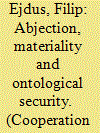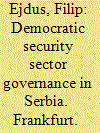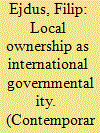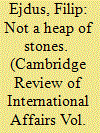|
|
|
Sort Order |
|
|
|
Items / Page
|
|
|
|
|
|
|
| Srl | Item |
| 1 |
ID:
181532


|
|
|
|
|
| Summary/Abstract |
Ontological security scholarship in International Relations (IR) has predominantly focused on the importance of social environments for the healthy sense of self. However, material environments can also provide an important source of ontological security. In my previous work I have argued that to assume this role of ‘ontic spaces’ material environments need to be discursively linked to states’ self-identity either through projection or introjection. In this article, I draw on the work of Julia Kristeva to argue that ontic spaces can also come about through abjection or the rejection of a material environment from the narrative of the self. I illustrate this theoretical point in the case study of the Serbian Orthodox Church of Christ the Saviour in Pristina. Its construction began in 1992 during the rule of Slobodan Milošević but was never finished due to the Kosovo war in 1998/9. Over the years, as all proposed changes are considered to be a threat to a healthy sense of self of either Serbs or Albanians, the building has been turned into an abjected ontic space, an ambiguous symbol undermining the self/other and victim/oppressor boundaries and as such both repels and attracts, threatens and protects.
|
|
|
|
|
|
|
|
|
|
|
|
|
|
|
|
| 2 |
ID:
104800


|
|
|
|
|
| Publication |
Frankfurt, Peace Research Institute Frankfurt (PRIF), 2010.
|
| Description |
36p.
|
| Series |
PRIF reports no. 94
|
| Standard Number |
9783942532044
|
|
|
|
|
|
|
|
|
|
|
|
Copies: C:1/I:0,R:0,Q:0
Circulation
| Accession# | Call# | Current Location | Status | Policy | Location |
| 056058 | 320.9569/EJD 056058 | Main | On Shelf | General | |
|
|
|
|
| 3 |
ID:
157983


|
|
|
|
|
| Summary/Abstract |
The European Union Police Mission for the Palestinian Territories (EUPOL COPPS) was established in 2006 to contribute to the establishment of effective policing in support of an independent and democratic Palestinian state. EUPOL COPPS is often commended for its contribution to the professionalization of the Palestinian security sector under local ownership. Drawing on 40 interviews, we argue that the mission can be considered effective and locally owned only from a narrow technocratic perspective, which denies the political reality of continued occupation and absence of democracy. A broader analysis, which includes the voices of ordinary Palestinians, reveals that EUPOL COPPS contributed to the professionalization of authoritarian policing under continued Israeli occupation. Our findings show the limits of technocratic approaches to peacebuilding interventions and call for a stronger engagement with the ultimate beneficiaries of peacebuilding missions.
|
|
|
|
|
|
|
|
|
|
|
|
|
|
|
|
| 4 |
ID:
155691


|
|
|
|
|
| Summary/Abstract |
One of the core principles of EU interventions under the Common Security and Defence Policy (CSDP) has been local ownership. While the EU takes pride in fully respecting this principle, the existing research suggests that the implementation has been far from smooth. However, we still know very little how this principle is conceptualised and operationalised, let alone why its implementation has been so difficult. Drawing on document analysis and 27 in-depth interviews, the article makes 3 arguments. First, ownership is increasingly construed in the EU policy rhetoric as a middle ground between imposition and restraint. Second, in practice, ownership is operationalised as an externally driven, top-down endeavour, resulting in the low degree of local participation. Third, in addition to the obstacles normally faced by other peace-builders, the EU’s efforts to implement ownership are constrained by the politics and policy-making of CSDP. The arguments are illustrated in a case study of the European Union Mission on Regional Maritime Capacity Building in the Horn of Africa (EUCAP Nestor).
|
|
|
|
|
|
|
|
|
|
|
|
|
|
|
|
| 5 |
ID:
157978


|
|
|
|
|
| Summary/Abstract |
While some Foucault-inspired studies construe local ownership in international interventions as a form of liberal governmentality that aims to govern through freedom, others lambast it as an illiberal governmentality that is likely to be resisted because it undermines local autonomy. However, we still do not know what is the rationality behind local ownership, how it is being operationalized, and why a principle that aims to govern through freedom ends up curtailing it. I argue that local ownership, echoing the colonial principle of indirect rule, is driven by the rationality of advanced democracies on how best to govern global insecurities at a distance. Consequently, ownership is operationalized as responsibilization for externally designed objectives. This often gives rise to local resistance which undermines international efforts to achieve ownership. I illustrate my arguments with evidence from the EU Mission on Regional Maritime Capacity Building in the Horn of Africa (EUCAP Nestor).
|
|
|
|
|
|
|
|
|
|
|
|
|
|
|
|
| 6 |
ID:
155805


|
|
|
|
|
| Summary/Abstract |
Extant scholarship on ontological security in international relations has focused on the significance of social environments for state identity. In this article, I argue that material environments also provide an important source of ontological security for states. In order to assume this role material environments need to be discursively linked to state identity through either projection or introjection. Once incorporated into state identity narratives, material environments become ‘ontic spaces’: spatial extensions of the collective self that cause state identities to appear more firm and continuous. However, ontic spaces are inherently unstable and require maintenance, especially during periods of crisis or transition. States bear agency in this process but they never achieve full control, as identity discourses are continuously contested both domestically and internationally. I illustrate these claims by looking at the role of the General Staff Headquarters in Belgrade, destroyed by the North Atlantic Treaty Organization in 1999, in the ontological security of Serbia.
|
|
|
|
|
|
|
|
|
|
|
|
|
|
|
|
| 7 |
ID:
157977


|
|
|
|
|
| Summary/Abstract |
Since the early 2000s, the “local turn” has thoroughly transformed the field of peacebuilding. The European Union (EU) policy discourse on peacebuilding has also aligned with this trend, with an increasing number of EU policy statements insisting on the importance of “the local.” However, most studies on EU peacebuilding still adopt a top-down approach and focus on institutions, capabilities, and decision-making at the EU level. This special issue contributes to the literature by focusing on bottom-up and local dynamics of EU peacebuilding. After outlining the rationale and the scope of the special issue, this article discusses the local turn in international peacebuilding and identifies several interrelated concepts relevant to theorizing the role of the local, specifically those of effectiveness, ownership, and resistance. In the conclusion, we summarize the key contributions of this special issue and suggest some avenues for further research.
|
|
|
|
|
|
|
|
|
|
|
|
|
|
|
|
|
|
|
|
|